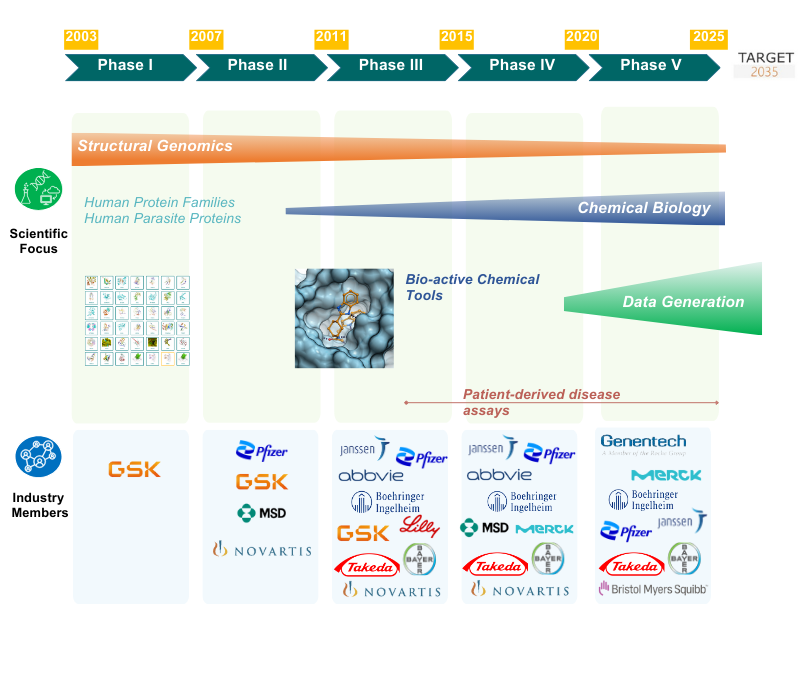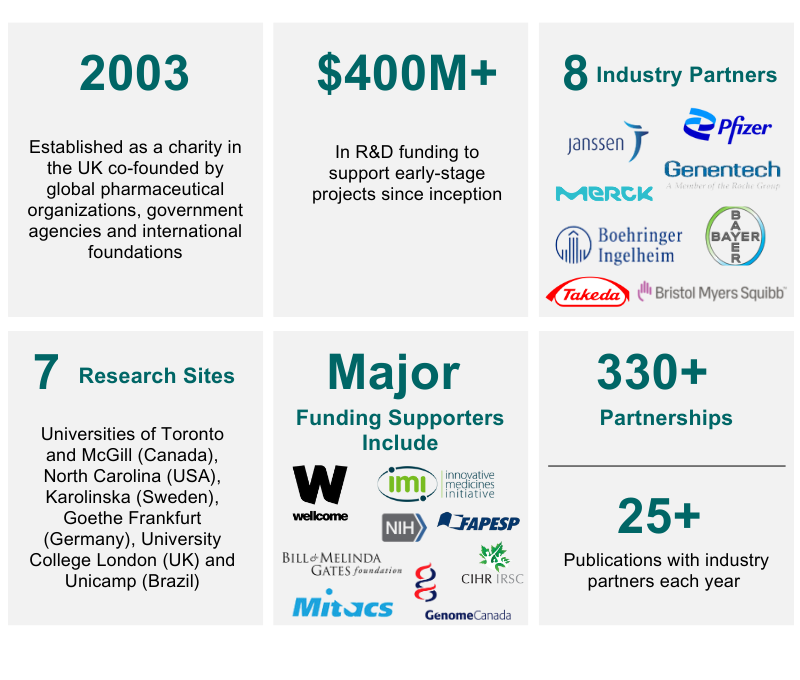A global public-private partnership that supports the discovery of new medicines through open-access research.
SGC aims to understand the function(s) of all proteins encoded by the human genome and accelerate the discovery of new medicines
Founded in 2003, the Structural Genomics Consortium (SGC) is a UK-registered charity with its head office in Toronto, Canada. As a global public-private partnership committed to open science principles, the SGC fast-tracks new medical discoveries by fostering and organizing collaboration among a vast network of scientists from academia and industry and making all its research output freely accessible. SGC is currently one of the largest and longest-running biomedical research consortia in the world with current contributions from nine Pharma industry members.
The SGC laboratories are currently located at Goethe University Frankfurt, Karolinska Institutet, McGill University, University College London, the University of North Carolina Chapel Hill, the University of Toronto and the Unicamp. These experimental hubs generate robust and reproducible data, knowledge and reagents to test biomedical hypotheses, including computational predictions, for drug targets and mechanisms.
SGC’s network comprises approximately 250 scientists, who are actively engaged in employing, developing, and exchanging their high-throughput structural biology, medicinal chemistry, and assay development expertise.
Visit our Career Page and find all the available positions in SGC

The Evolution of SGC
During its first ten years, SGC scientists successfully determined the three-dimensional structures of thousands of human proteins and made them available in the PDB. In the second decade, their focus shifted toward structure-guided medicinal chemistry and creating an industry consortium to generate new chemical probes for protein families that are not well-understood in the human genome but linked to human disease. The third decade is dedicated to scaling up the chemical probe efforts by collaborating with the computational drug discovery community to generate data needed for Artificial Intelligence (AI) and Machine Learning (ML) to transform early drug discovery into a primarily computational approach to accelerate the discovery of new medicines.
By providing chemical probes for all known human proteins, SGC is supporting researchers in unravelling scientific puzzles, leading to treatments for a wide array of conditions.
SGC’s efforts will support the vision of Target 2035, an open science global movement founded by the SGC, which aims to develop and openly distribute chemical probes for every protein in the human proteome by 2035. Collaborating under the auspices of Target 2035, SGC aims to catalyze the development of new medicines by investigating regions of the human genome that have not yet been researched extensively.

SGC in a Nutshell
Embracing an open science, ‘no-patent’ paradigm, SGC generates unencumbered knowledge, data and reagents, such as protein structures and chemical probes, for all scientists to use. SGC’s chemical probes are now indispensable for researchers globally, helping to understand previously uncharted facets of disease biology and propelling drug discovery. SGC’s high-calibre protein science data provides a foundation for rapidly growing datasets that enable computational methods such as AI to accelerate chemical probe creation and drug discovery. This innovative approach will lead to future breakthrough treatments for diseases such as infectious diseases, cancer, Alzheimer's, Parkinson's, and rare diseases.

Our Core Pillars and Open Access Approach
SGC is fully committed to the Target 2035 goal by ensuring that all its work is guided by three core principles.
Our pioneering open science model for protein science, chemical biology and drug discovery adheres to the principles that all data, reagents and tools generated by SGC scientists (including those developed in collaboration with partners from the private sector and academia) must be made publicly available (deposited into public databases) without any restrictions on their use. This approach provides investigators, partners, and collaborators with the freedom to operate while also saving significant resources, enhancing the quality of global research, and accelerating early-stage drug discovery for all.

SGC in a glimpse
Learn all about Structural Genomics Consortium in our Backgrounder .

